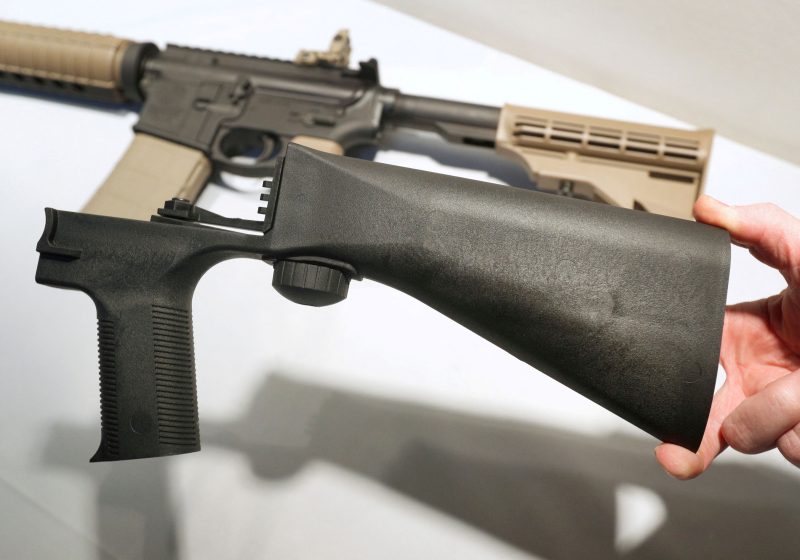
Supreme Court agrees to review gun-rights challenge to bump stock ban
The Supreme Court said Friday that it would review a challenge to the federal ban on bump stocks announced by the Trump administration after the devices were used in a 2017 mass killing on the Las Vegas Strip.
The Biden administration had asked the Supreme Court to reverse a lower-court ruling against the ban on the devices, which speed up how quickly bullets can be fired when attached to rifles.
Solicitor General Elizabeth B. Prelogar told the justices that the lower court decision “threatens significant harm to public safety.”
Bump stocks, she said, fit the legal definition of machine guns, banned since 1986, because the devices “allow a shooter to fire hundreds of bullets a minute by a single pull of the trigger. Like other machine guns, rifles modified with bump stocks are exceedingly dangerous; Congress prohibited the possession of such weapons for good reason.”
Attorneys for Michael Cargill, who challenged the ban after he was forced to surrender the devices in 2019, told the court that the bump stocks are useful for individuals with limited finger dexterity and noted that for nearly a decade, the federal government did not classify the devices as machine guns.
Americans bought 520,000 bump stocks during the period in which the Bureau of Alcohol, Tobacco, Firearms and Explosives allowed them. The rule requires owners to either surrender or destroy devices they lawfully obtained.
“Those (like Cargill) who have already surrendered their bump stocks will never recover them if the rule stands. ATF admits that the expected loss of property will exceed $100 million,” Cargill’s attorneys said.
The Supreme Court’s acceptance of the case in a brief order on Friday means it will be heard and decided sometime this term, which ends in June.
In October 2017, a gunman firing from a hotel near an outdoor country music festival on the Las Vegas Strip killed 58 people and wounded hundreds more before killing himself. Bump stocks found in the shooter’s hotel room enabled him to fire hundreds of bullets into a crowd in minutes.
The mass killing prompted then-president Donald Trump to announce that he had signed an order directing the Justice Department to change regulations to ban the devices starting in 2019. ATF amended the regulations and reclassified bump stocks as machine guns under the “best interpretation” of the statute.
The rules were changed before the Supreme Court’s significant 2022 decision on gun laws, which found a constitutional right to carry firearms outside the home and called into question other gun restrictions that did not have historical precedent. The justices are set to hear another Second Amendment case next week involving a challenge to a federal law that prohibits a person subject to a domestic violence restraining order from possessing a firearm. The challenge is based in part on the 2022 Supreme Court ruling.
The bump stock ban was appealed to the Supreme Court before, after three appeals courts rejected challenges to ATF’s final rule, but the justices did not agree to take any of those cases.
This time, a District Court and a unanimous panel of the U.S. Court of Appeals for the 5th Circuit upheld the ban. After rehearing by a full complement of judges, the 5th Circuit reversed in a fractured ruling. The Justice Department then asked the Supreme Court to intervene.
